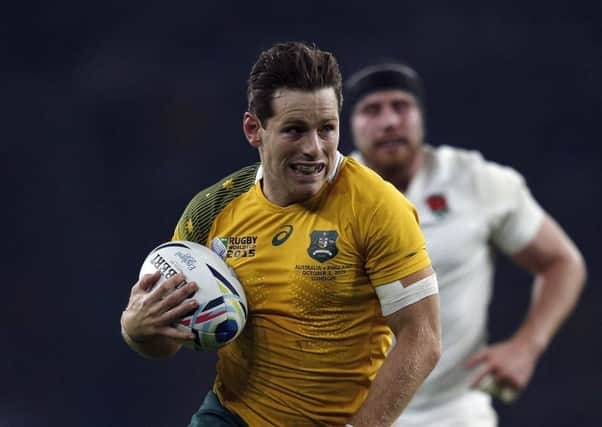Scotland defeat was hard but it’s worse for England


Australia seemed to be operating at an entirely different speed to England, and I can’t have been alone in having had one of those rare jolts of spectator astonishment when Kurtley Beale and Bernard Foley cut back against the grain for Foley’s second try, such was the speed of thought and foot involved in their simple interchange of passes.
England’s phase play, meanwhile, degenerated into hitting single runners off nine, basically teeing them up to be denuded of the ball by the Australian back row. England have been brilliant at times under Stuart Lancaster and we know they can play more imaginatively than this, so there can be no denying that they were affected by the pressure of both the occasion and the whole event. It would, then, take a very hard Scottish heart not to feel sorry for his players on Saturday night after failing so spectacularly and publicly, especially knowing the effect it may have on their future careers and even their lives outside rugby.
Advertisement
Hide AdAdvertisement
Hide AdScotland, too, came up short against South Africa, although clearly with less far-reaching consequences. I’m guessing we all know the story by now, that we were physically dominated by a bunch of enormous men. Particularly in the first half, we had no answer to their power, and it’s no wonder when you look at their pack. All eight of them are ball carriers but six of them are exceptional, world-class ball carriers, and this conveyor belt of runners were able to get over the gain-line at will. I am guessing that at half-time the Scotland coaches demanded an emphasis on chop tackles, as we were definitely more effective in the second half when we went lower, and that was a factor in us gaining a bit of a foothold in the game.
When we did get the ball, and when our runners weren’t being engulfed in a bear hug by two large Springboks, we at least looked like we had some variation in attack, certainly compared to England just afterwards. Just for a moment in the second half we had a chance to make a game of it but, unfortunately, during the ten minutes following that amazing try we committed four handling errors and conceded three penalties and a yellow card. Any momentum we had was lost.
But whatever the details of the two losses, both England and Scotland were beaten by two teams who were simply better. It’s difficult to say whether, as a fan, that makes it easier or harder to take. Remember how Brazil’s supporters were almost laughing as the final goals went in during their 7-1 defeat to Germany? It was as if further evidence of their humiliation being down to a straightforward gulf in class almost came as a relief.
As a player, however, I know it is something with which it is hard to reconcile yourself; that no matter what level you think you have reached, there is always someone out there better than you. That unavoidable realisation can be hard to deal with in the aftermath of a huge game and, when you add in the physical battering you have just received, you end up with a pretty dark night of the soul.
The consolation for this Scotland team, perhaps, is that they are at least close to maximising their own abilities, and you get the feeling that they have a clear understanding of what will be required over the next few years if they are to progress enough to properly compete with the likes of South Africa. So, our forwards and midfield need to get even more physical, we need to minimise those little errors of handling and discipline at crucial moments, and our set-pieces need to be consistently rock solid.
Unlike New Zealand and South Africa, we don’t have the expectations and harsh judgement of a whole nation to drive these changes on, but it seems we finally have a group of players and coaches who are talented and dedicated enough to generate their own culture of constant improvement, just as Ireland did in the noughties. They created a winning mentality almost from nothing, just as Scotland are attempting to now.
This weekend’s match, against a team we have struggled with in the past, will provide another measure of exactly where we are. Samoa’s defence is less smothering than that of the Springboks, and we should find a few more doglegs and half-gaps, which is where those offloads in midfield and extra passes between the forwards, nullified against South Africa, become so effective. We ought to dominate the lineouts, on both throws, and the backs will be desperate for some clean ball after the last match.
What you really hope for is that we start the game with the same intent and intensity as South Africa did against us, and that by half-time we have let Samoa know exactly where they sit in the international pecking order.